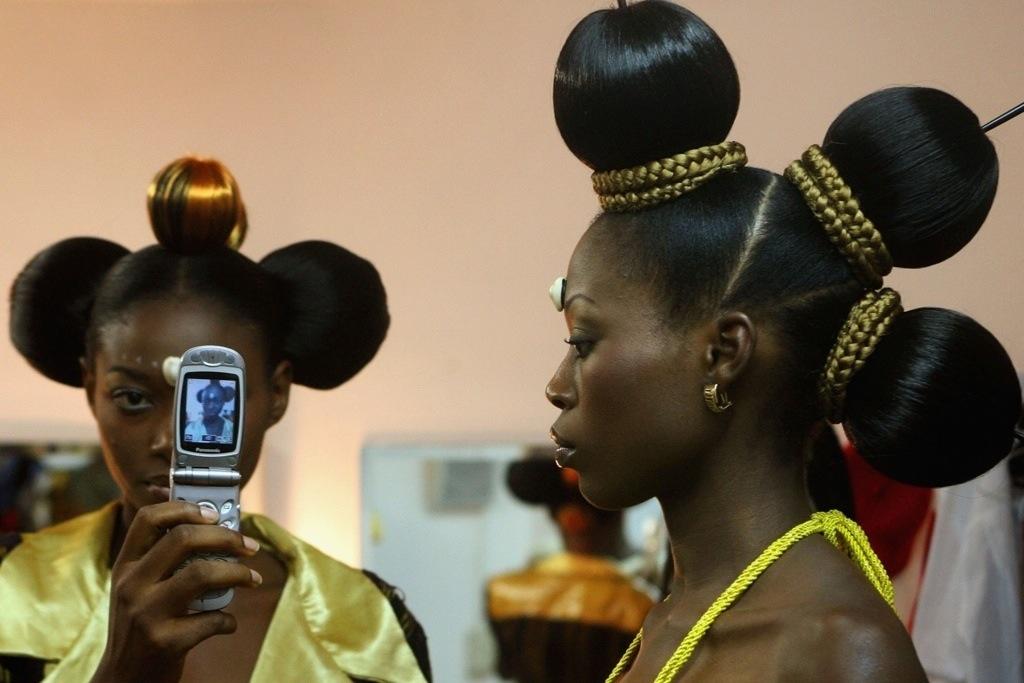Nigerians tweet to keep elections honest
Hip young Nigerians are using Twitter and other social media with their smartphones to make their elections honest and transparent. Here a Nigerian fashion models take photos of each other with a cell phone.
LAGOS, Nigeria — Armed with Blackberries and Twitter feeds, a growing group of hip young Nigerians are gearing up to stamp out fraud at this weekend’s presidential elections.
They hope social media can take on the violence and rigging that has blighted polls in Africa’s most populous country in recent years.
Gbenga Sesan, a 33-year-old IT consultant and activist, is one of the leaders of such efforts. His team has designed a smartphone application called Revoda, which allows voters to instantly upload reports of delayed voting materials and intimidating gangs at their local polling stations to Sesan’s database. A daily summary is then sent to Nigerian officials and Western election observers, as well as being posted on Revoda's website.
“This allows us to follow the process — people can capture not only results but also details of the day … and then they can put them out there quickly,” Sesan said of the impact of new technology.
During Nigeria’s parliamentary polls last Saturday, which kicked off three weeks of elections for local and national positions, he was busy uploading photos and videos from polling stations to Facebook and YouTube.
“We’ve got one [Blackberry] video of a policeman who was evidently drunk and intimidating people," Sesan said. "If anyone wants to go to court they have a lot of evidence.”
Another venture, Reclaim Naija, uses text messaging and email reports to compile a live online map of troublespots. And then there are the so-called “Twitter activists.” They look out for rigging, spread warnings about bombs at polling stations and generally express distaste with the political elite — in less than 140 characters, of course.
“Twitter is quick and dirty. It forces you to be concise,” said Amara Nwankpa, another IT consultant turned activist, who has more than 5,000 followers on Twitter. “Most young people have short attention spans so [this] grabs them.”
When a bomb exploded at an election commission office in northern Nigeria last week, the Twitterati played an important role in spreading the word, Nwankpa said. When an election observer suspected that ballot boxes were being tampered within an eastern state, she raised the alarm via this medium.
“When you bring attention to things, it gets harder to rig,” Nwankpa concluded.
During 50 years of independence, Nigeria has lurched between military coups and flawed elections. Political office is often seen as a route to self-enrichment in Africa’s largest oil and gas producer, whose abundant natural resources mostly benefit a tiny elite while over 80 percent of Nigeria's 150 million people live on less than $2 a day.
Yet there are strong hopes that this month’s polls will be the most credible since the end of army rule in 1999. One reason is the appointment of Attahiru Jega, a respected academic, as the head of the electoral commission, which is usually complicit in rigging. Another is the growing use of social media and a growing desire for proper elections among voters themselves.
Things do seem to be getting better. Last weekend’s parliamentary elections were widely held to be an improvement from previous years. These polls also gave the election commission and social media activists a chance to try out their anti-fraud measures before the looming presidential vote, in which tensions will run far higher.
In a country of widespread poverty and poor infrastructure, snazzy technology has its limitations. Many Nigerians cannot afford smartphones and struggle with slow internet connections. Under federal law, digital evidence cannot be submitted in court, although judges can waive this rule for individual cases if they see fit.
However, in a country where 70 percent of the population is under 30, social media also looks increasingly like the way forward. Sesan observed that Facebook and Twitter give a voice to young Nigerians, who make up the bulk of the population but often feel that they are ruled by aging godfathers.
“A lot of politicians are surprised. They wonder, ‘how can these guys capture so much information and get it out there immediately?’” said Sesan. “But I am not surprised … this is a young country.”
Every day, reporters and producers at The World are hard at work bringing you human-centered news from across the globe. But we can’t do it without you. We need your support to ensure we can continue this work for another year.
Make a gift today, and you’ll help us unlock a matching gift of $67,000!
